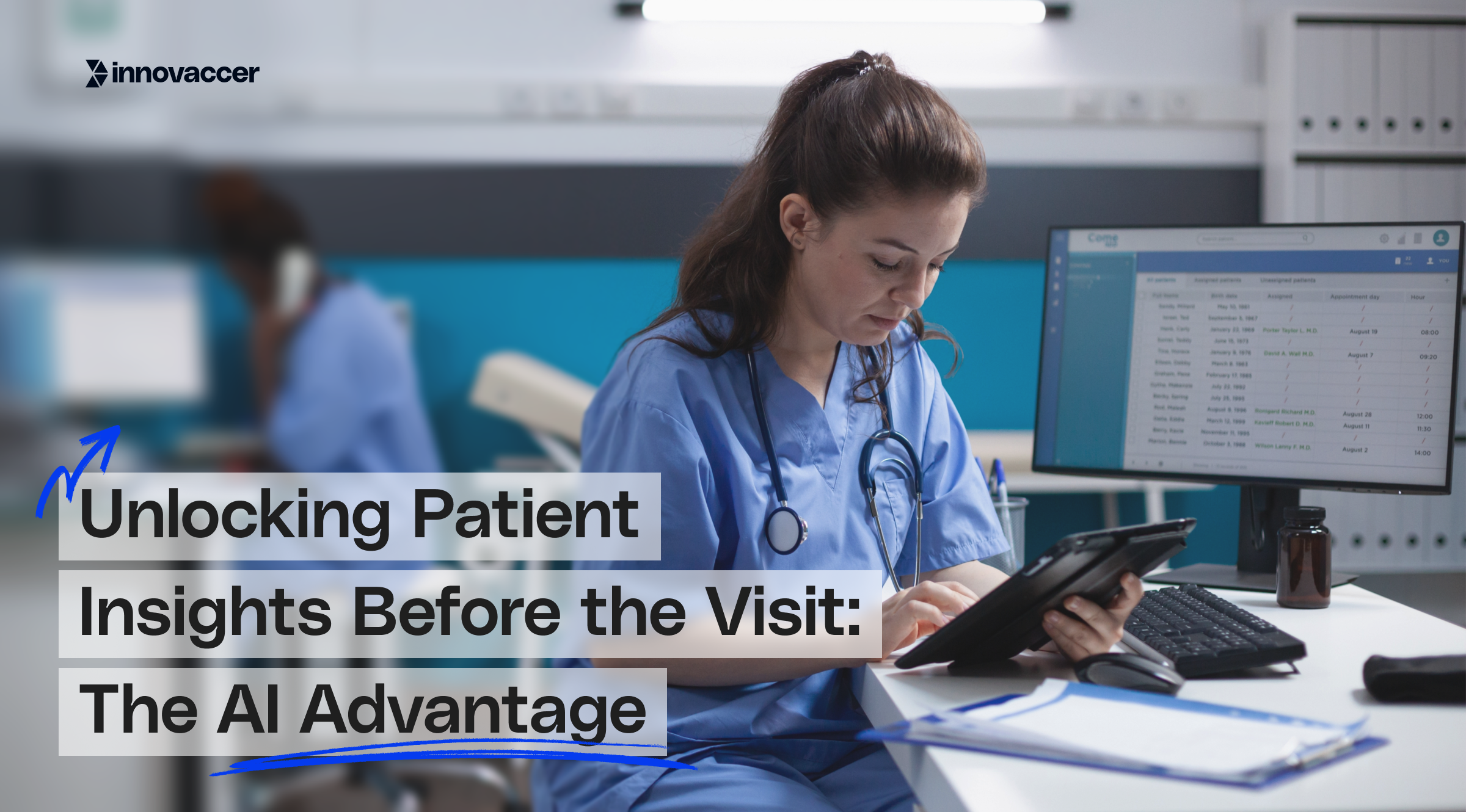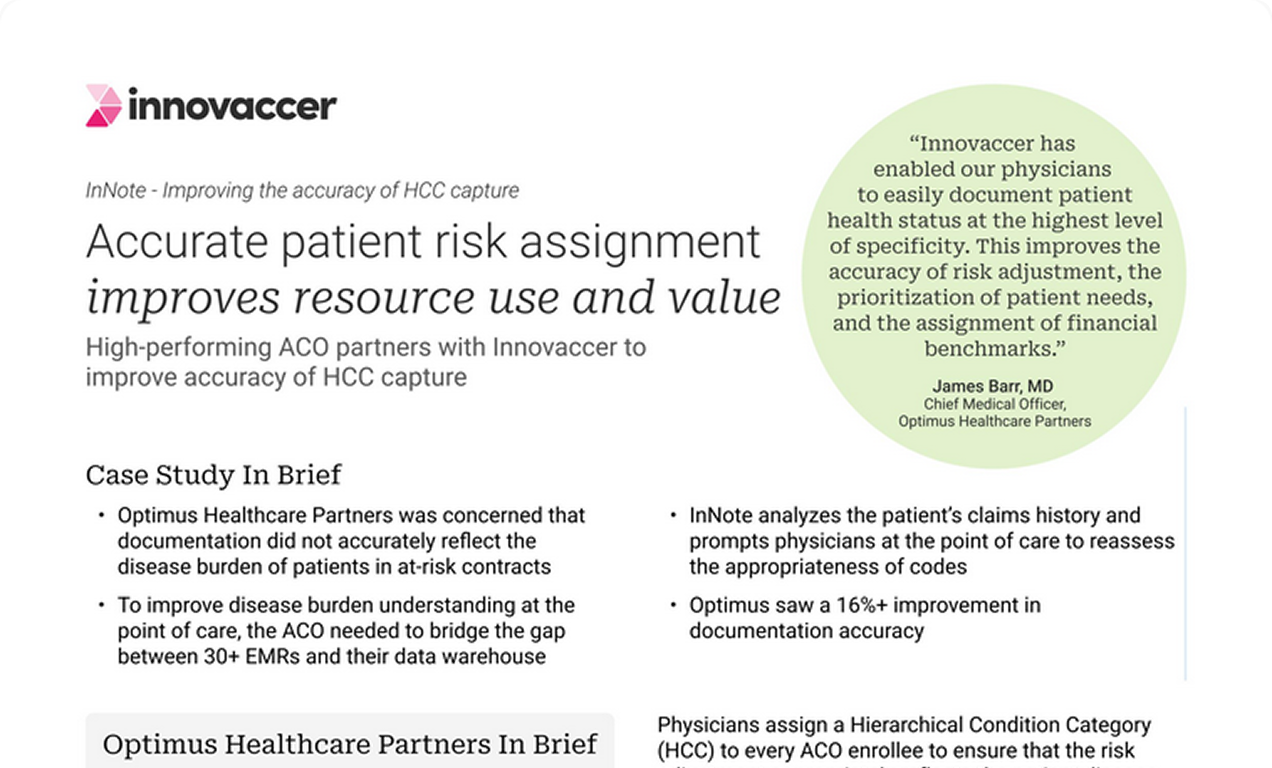Unlocking Patient Insights Before the Visit: The AI Advantage


Today’s clinicians face the dual challenge of delivering highly personalized care within brief clinician encounters, while managing increasingly complex patient histories and fragmented data systems. Historically, much of this burden fell on the physician’s shoulders during moments between visits. AI is now modifying the whole process, allowing providers to begin each encounter already informed.
Increasingly, physicians are walking into appointments with a clear and timely understanding of each patient’s needs, even before the first exchange. According to Innovaccer’s State of AI report, 32% of healthcare professionals can gather patient context very quickly. This preparedness isn’t just the result of clinical experience or intuition. AI assists to synthesize vast amounts of patient data into actionable insights that make physicians better prepared for each visit.
This isn’t a vague promise of “smarter healthcare.” It’s a tangible, day-to-day shift in how clinical preparation happens, and it’s improving the quality of care.
The Problem With Pre-Visit Chaos
Before any clinical conversation begins, providers are expected to navigate an overwhelming volume of data: lab results, previous visits, specialist notes, imaging reports, medications, and social determinants of health. This information is critical to understanding the patient’s condition, but it is not easy to access or interpret, especially when systems don’t talk to each other.
AI addresses the challenge by easily reading and interpreting structured and unstructured data across the care continuum. More importantly, they synthesize this data into concise, context-aware summaries. Physicians are able to quickly identify what’s changed, what’s missing, and what needs follow-up.
Without any need to search for key data points across multiple sources, AI enhances the physician’s situational awareness before the appointment. They can approach the visit with a clear picture of what matters right now.
Key AI Capabilities Powering Pre-Visit Insights
The ability to generate relevant patient insights before a clinical encounter is not the result of a single technology. It is the coordinated work of several AI capabilities working in collaboration. These capabilities are purpose-built for the complexities of healthcare data, and together they enable a more informed and proactive care experience:
- Natural Language Processing (NLP): In many cases, the most valuable clinical details are buried in text-free notes. NLP algorithms are designed to extract key information and convert it into standardized, actionable elements that physicians can review quickly.
- Predictive Analytics: By analyzing patient histories alongside large-scale population data, machine learning models can estimate the likelihood of future events such as hospital readmissions and disease progression. These predictions are presented in a way that allows clinicians to intervene earlier, prioritize outreach, and guide care decisions more effectively.
- Data Harmonization: Healthcare information often resides in disconnected systems with inconsistent formats. AI-enabled integration tools reconcile this fragmentation, deduplicating entries and aligning data across sources to build a complete, accurate patient profile.
- Summarization Models: this wealth of information is converted into a structured pre-visit snapshot. Instead of listing every point, these tools distill data into clinically relevant points such as what has changed since last visit, what issues remain open, and what action is likely needed.
From Catching Up To Staying Ahead
These AI capabilities operate quietly behind the scenes, but their collective impact is significant.
By analyzing patterns in a patient’s history and comparing them to wider population-level datasets, AI tools can generate real-time risk predictions. These insights may flag potential hospitalizations, emerging chronic conditions, or care gaps that haven’t yet surfaced in conversations.
These capabilities allow providers to anticipate clinical deterioration, flag missed preventative screenings, or identify medication non-adherence before such issues escalate. This proactive awareness fundamentally changes the nature of the visit. Instead of reacting to what patients bring up, providers are empowered to guide the conversation based on a broader and more proactive understanding of their needs.
This predictive capability is especially powerful in value-based care models, where success depends not only on treating illness but on preventing it. AI shifts the clinical approach from reactive triage to strategic anticipation.
Contextualizing The Patient Journey
Fragmentation in care delivery continues to be a pervasive challenge. A patient might see a primary care doctor in one system, a specialist in another, and visit the ER in between, leaving critical details scattered across portals and PDFs. That fragmentation not only complicates treatment decisions, it also erodes the human connection that defines good medicine.
AI helps solve this by providing a coherent view of the patient journey. AI extracts all relevant information into a common narrative, be it a recent hospitalization, a trend of missed appointments, or a new social stressor like food insecurity, making sense out of everything in the same context. The result is a longitudinal, whole-person view that helps doctors understand stories, not just symptoms.
With this foundation, providers don’t need to spend unnecessary time recapping the patient’s whole story. They already know how to lead with empathy and act with purpose.
Integrated Seamlessly Into Clinical Workflows
One of the key drivers of AI adoption in clinical settings is its ability to integrate into existing workflows without disruption. The best solutions don’t ask physicians to change their workflow. They’re embedded directly into the EHRs or surface insights during note-writing or chart review without any complex interface.
This type of seamless integration is key. AI works quietly in the background with physicians, curating data, highlighting risks, and clarifying care gaps. It acts as a trusted partner to the physicians, who would’ve missed out on important details if not for AI assisting them along the way.
Crucially, this technology is not designed to replace clinical expertise, but to support it. By reducing cognitive load and minimizing administrative friction, AI empowers physicians to focus on higher-order decision making and patient engagement.
Enhancing The Clinical Encounter
The difference is noticeable when physicians begin an encounter fully informed. Less time is spent confirming basic details or revisiting overlooked information. Instead, physicians are able to engage more meaningfully, offer precise recommendations, and demonstrate a greater understanding of the patient’s overall context.
For patients, it translates into a stronger sense of being heard and valued. They are not required to repeat their story or re-express prior concerns. The clinical dialogue becomes more focused, empathetic, and actionable.
From a system-wide perspective, the impact is just as significant. Better-prepared visits mean better outcomes, fewer redundant tests, more complete documentation, and stronger adherence to care plans. It is a quiet revolution, but one that is improving performance at every level.
Redefining Readiness In The Age Of AI
While the core of medicine remains grounded in the physician-patient relationship, the nature of preparation is undergoing a profound change. AI is enabling a new standard of clinical readiness, one in which insights are delivered prior to the encounter, equipping clinicians with the clarity to act decisively and compassionately.
Innovaccer’s solutions allow healthcare providers to shift from data retrieval to data-driven engagement, from fragmented records to unified understanding, and from reactive response to proactive leadership in care delivery. Explore how Innovaccer enables faster, more confident care decisions with AI. Book your demo today.


.png)






.avif)









.svg)
.svg)

.svg)

